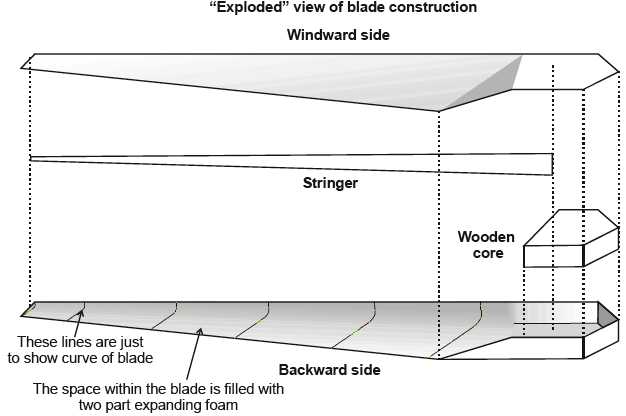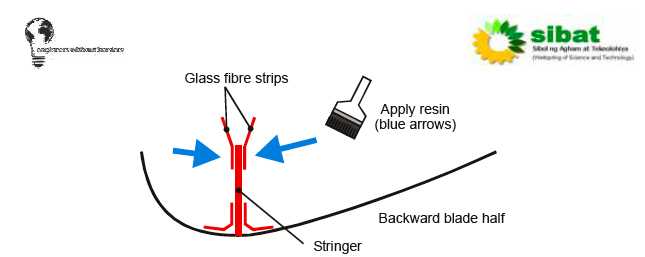I cam across this rather nice guide to fibreglass blade production that was produced by Andrew Corbyn & Matthew Little, of Engineers Without Borders and SIBAT – Philippines in 2008.
 It is based on using wooden blades from my older 2005 book “how to build a wind turbine” but I see no reason why it should not also work with my newer “Recipes” although the quantities would have to be scaled up or down to suit the diameter. The wooden blade is used as a plug for making two moulds that are used many times over for producing blade halves. The halves are stuck together and strengthened by a central stringer that looks a bit tricky to join onto the second half but the process is described.
It is based on using wooden blades from my older 2005 book “how to build a wind turbine” but I see no reason why it should not also work with my newer “Recipes” although the quantities would have to be scaled up or down to suit the diameter. The wooden blade is used as a plug for making two moulds that are used many times over for producing blade halves. The halves are stuck together and strengthened by a central stringer that looks a bit tricky to join onto the second half but the process is described.
 None of it looks as much fun as making wooden blades – lots of nasty smells and toxic dust – but it’s good to have options, and it can be hard to find large stocks of decent quality wood for batch production of blades.
None of it looks as much fun as making wooden blades – lots of nasty smells and toxic dust – but it’s good to have options, and it can be hard to find large stocks of decent quality wood for batch production of blades.
Download the guide from this link http://www.ewb-uk.org/system/files/WT_Blade_Manufacture_Guide.pdf


Thanks Leslie, Great to have more perspective. I don’t think it’s easy to make fibreglass blades!
Hugh
Hi Hugh,
I have been using this document, “How to make fibreglass blades” for my collection of 3.7m dia Wind turbines. The blade is exactly to your 3.6m design, but:-
A. The moulds really need serious strengthening, mine are now about 24kg each side. To stop twisting and curling. To be able to bolt the moulds together fast when foam filling, about 7 seconds, without the moulds the foam can split a blade.
B. The wood/ply core has problems when joining to the internal stringer, pay attention to the joints.
C. The joining process of the blade half’s is absolute hell, especially where the blade feathers out on the trailing edge. I now ensure that the last fine joining glassfibre is given plenty of brushing gel coat and then sanded down with an orbital sander to blend into the blade.
D. I have now re-designed the cloth layers as the original 16 pieces makes a heavy blade. I now have 4 full length but 3 x 75%, 3x 50% and 3 at 25%. but this still gives a complete blade weight of about 4.4kg.
I trust that these comments help.
Leslie Bryan